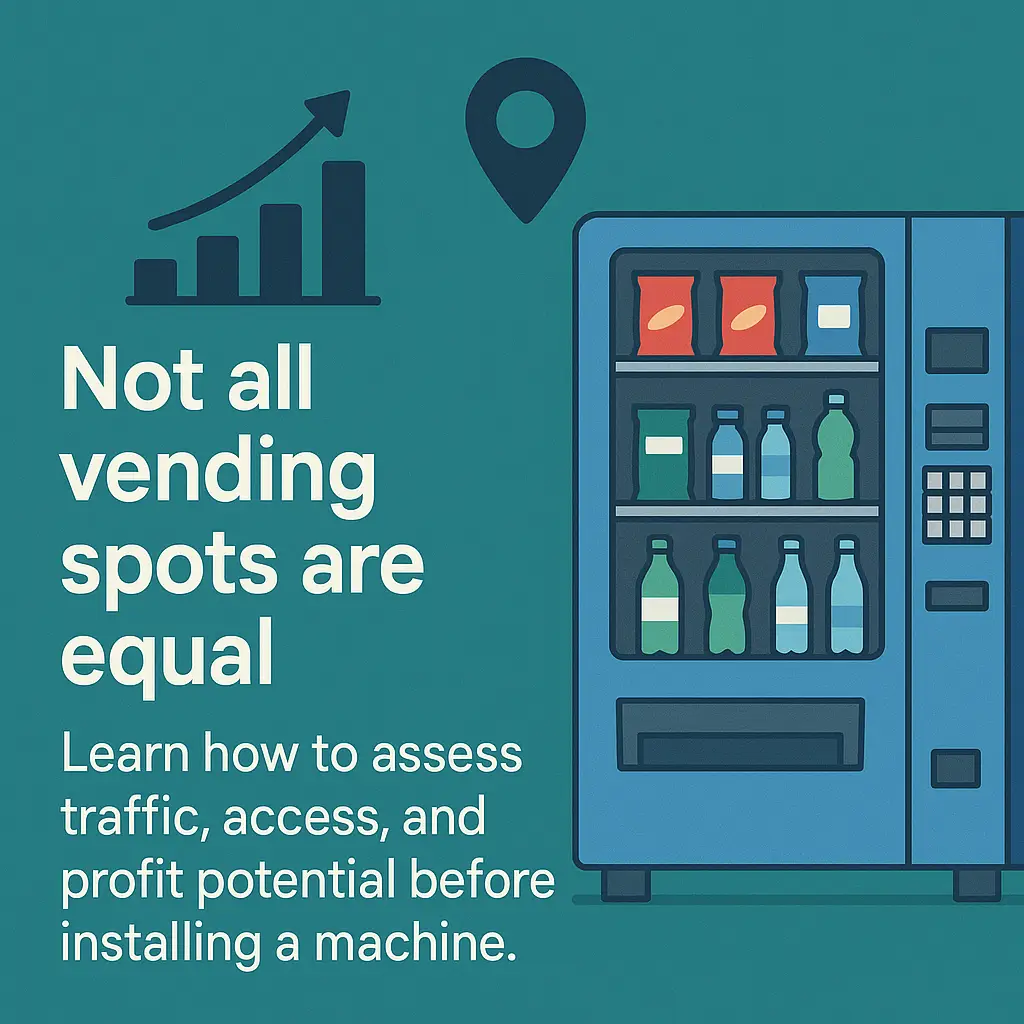How to Evaluate a Vending Machine Location
Not all vending spots are equal. Learn how to assess traffic, access, and profit potential before installing a machine.
Back to Vending Machine Locators ResourcesNot all vending spots are equal. Learn how to assess traffic, access, and profit potential before installing a machine.
Back to Vending Machine Locators ResourcesStart your 30-day free trial and get instant SMS and email alerts whenever a local business needs vending service. These are real location leads to help you grow your route — you decide which ones to buy, no obligations or contracts.
![]() High foot traffic increases product turnover and revenue
High foot traffic increases product turnover and revenue
![]() Visibility and signage improve user engagement and sales
Visibility and signage improve user engagement and sales
![]() Secure, maintained areas reduce theft and downtime
Secure, maintained areas reduce theft and downtime
30 days free, then $39 / month.
No Commitment. Cancel Anytime.

Choosing the right location for your vending machine business can make the difference between a profitable route and one that underperforms. Before committing to a site, it's crucial to evaluate several key factors to ensure success.
1. Traffic Volume and Type: Start by understanding the number of people who pass through the area daily. Ideal locations include office buildings, schools, gyms, and transit hubs. Beyond just volume, consider the type of traffic. Are these individuals likely to stop and purchase a snack or drink? A corporate office crowd may gravitate toward healthy snacks and energy drinks, while a school might lean toward simple snacks and bottled water.
2. Visibility and Accessibility: Placement within the location is just as critical. Machines should be visible, well-lit, and easy to access. A vending machine tucked behind doors or down far hallways won't catch as many eyes. Look for areas near entrances, main walkways, or break rooms. The more your machine is seen, the more it will be used.
3. Placement Agreement and Servicing: Discuss machine servicing with the property manager or business owner. Confirm that there’s consistent access for restocking and maintenance. Also, ask about indoor climate control to reduce equipment wear and tear. Make sure you understand the terms of any commission, rent, or exclusivity agreements.
4. Security and Reliability: High-theft or unsupervised areas can hurt your profits. Ensure the location is secure—inside a monitored building or in view of surveillance cameras. Dependable electrical connections, Wi-Fi access (if smart features are needed), and cleanliness are also essential for machine longevity and user satisfaction.
By analyzing these dimensions—traffic, visibility, access, and security—you’ll improve your chances of deploying profitable vending machines that require fewer service calls and generate steady revenue.
For tips on equipment investment, read our guide on buying versus leasing vending machines. You can also explore how equipment impacts workplace culture in our article on the benefits of vending machines in the workplace.
Vending Exchange connects vending operators with real businesses actively looking for vending services—including traditional machines, AI coolers, and office coffee. Get instant SMS and email alerts when new opportunities are available in your area. No contracts or monthly fees—just buy the leads you want. Start your free 30-day trial today and grow your vending business on your terms.
A profitable location has high foot traffic, easy access, good product fit, and minimal service disruptions.
You can visit at different times of the day, count foot traffic, and speak with location managers for daily averages.
Yes, customers need to see and easily access machines to make spontaneous purchases, which boost sales.
Ask about outlets, wattage limits, and maintenance schedules. Avoid places with frequent outages or weak current supply.
Yes, high-theft areas can hike maintenance costs and insurance. Choose secure, monitored, or locked environments when possible.
Be direct—present expected benefits like convenience and possible commissions. Clarify servicing needs and contract terms.
Avoid low-traffic areas, outdoor zones with exposure to weather, and spaces without reliable access for restocking.
Track machine sales weekly, inspect machine uptime, and compare against other machines at similar locations.
Smart machines need Wi-Fi or cellular access—confirm signal strength before placement, especially in basements or metal buildings.
Location typically matters more. Even a great machine won’t sell well without the right audience and foot traffic.